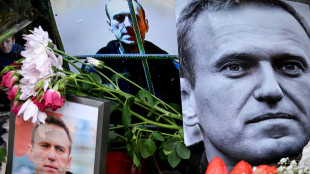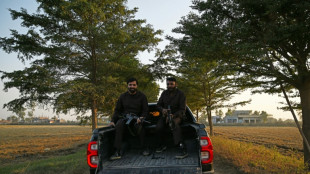
'No plan B': France set on Olympics river opening despite attack

The French government is insisting it will keep a plan to hold the 2024 Paris Olympics opening ceremony on the River Seine even after a deadly attack in the French capital at the weekend amplified existing security concerns.
Sports Minister Amelie Oudea-Castera told French radio that the plan could still be adapted within the idea of the river flotilla, as media reports indicated grave concern within the security forces that the ceremony could be vulnerable to attack.
A man known to the authorities as a radical Islamist with mental troubles on Saturday stabbed to death a German tourist close to the Eiffel Tower by the River Seine in what prosecutors are investigating as a suspected act of terror.
"There is no plan B, we have a plan A within which we have several alternatives," the minister told France Inter radio.
She said the "terrorist threat and in particular the Islamist threat exists" but added "it is not new and it is neither specific to France nor specific to the Games".
The plan is for a flotilla of boats to proceed along the Seine from Austerlitz bridge in the west of Paris to Iena bridge in the centre carrying athletes, delegations and officials.
The culmination of the ceremony would then take place in front of the famed Trocadero Gardens across the river from the Eiffel Tower.
- 'Spectator capacity unclear' -
The idea has been championed by President Emmanuel Macron, who wants a unique spectacle that will leave a lasting imprint in the history of the Games.
It would be the first time in Olympics history that the opening ceremony takes place outside the main athletics stadium.
But Oudea-Castera added that there were "a certain number of adjustment variables", notably the number of spectators who can attend, which will be decided in the spring and can be "modulated".
Also subject to adjustment could be "the number of events which will be authorised around the area and in Paris" on the sidelines of the ceremony and "the management of security perimeters".
Authorities initially planned to offer 500,000 free tickets for the ceremony as well as 100,000 paid tickets closest to the action, creating a gargantuan event with a total of 600,000 ticket holders and one of the largest spectator events in human history.
Even if the figure of paying spectators is not likely to change, that of the free spectators has yet to be finalised.
Several sources close to the negotiations recently told AFP that the latest estimate was for "less than 300,000 spectators" to be allowed in for free.
- 'Satisfactory manner' -
But asked whether any relocation of the ceremony was being considered, Oudea-Castera emphasised: "this is not the hypothesis on which we are working".
The attacker chose the Eiffel Tower area more for its "symbolic" side than as an "Olympic site", Emmanuel Gregoire, Paris's first deputy mayor told France Info radio.
Recalling that the Rugby World Cup had been hosted this autumn in Paris and elsewhere in France without "any incident", he said that it is not "the Olympics... that must be called into question", but "the way in which we anticipate the risks in treating these individuals."
"I am sure that we will be able to prepare for these Olympics in a very satisfactory manner," he added.
Paris police chief Laurent Nunez had last week already told the Le Parisien newspaper of tough security perimeters planned for the Games, with residents living near Olympic venues needing to apply for a QR code allowing them to pass police barriers.
Special rules will apply during the opening ceremony on July 26, when high-security, or "red", perimeters will be "very large", Nunez said.
"The only people getting through will be people with a valid reason, in other words people going to their hotel, or their home, or people with a ticket for the ceremony," he said.
T. Jones--BTZ

 London
London

 Manchester
Manchester
 Glasgow
Glasgow
 Dublin
Dublin
 Belfast
Belfast
 Washington
Washington
 Denver
Denver
 Atlanta
Atlanta
 Dallas
Dallas
 Houston Texas
Houston Texas
 New Orleans
New Orleans
 El Paso
El Paso
 Phoenix
Phoenix
 Los Angeles
Los Angeles



